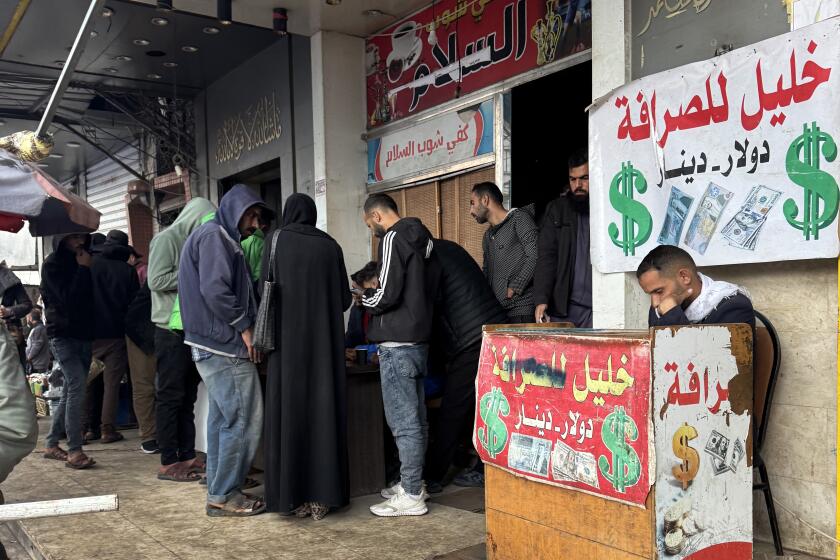So Far, Afghan Government Has a Credibility Gap
- Share via
KABUL, Afghanistan — Najib Miruddin remembers the precise moment his enthusiasm for the Afghan central government ended: It was 9 a.m. on Sept. 3.
That was when a band of armed soldiers on a tractor arrived in the Sher Pur neighborhood here and razed his house of 25 years. The family’s television, clothes and carpets were all buried under the wreckage. Not even the sight of his elderly mother running out of the house crying over the Koran stopped the soldiers.
“I didn’t think our government would do this to us,” he said. The brick home was among 30 destroyed on the orders of the local police chief to make way for mansions for high-ranking government officials, including the mayor of Kabul and the ministers of defense and education. The scandal embarrassed President Hamid Karzai, who fired the police chief and ordered an inquiry. Residents are waiting to find out whether they will be evicted or moved to another neighborhood.
That and other experiences have soured many Afghans on the government. With the opening Sunday of the loya jirga, or grand assembly, which will deliberate in the coming days over a new national constitution, there is a perception that the Western-backed government has done little to improve the lives of its citizens.
“I only want a law that will stop powerful people from seizing our homes,” said Miruddin, 27.
In the meantime, he is rebuilding his home because winter is setting in. “The good bricks were all taken by the soldiers. I am using the leftovers,” he said as he scraped mud off his fingers and wiped them on a red sweatshirt emblazoned “Happy Holidays.”
“There is a question of how much people are aware of problems this government is facing after 23 years of war,” said Ahmad Nadery, commissioner of the Afghan Independent Human Rights Commission, who investigated the scandal. “The expectations of the people are increasing. This is because international support is there, the government is legitimate and people expect there should be immediate change in their lives, which isn’t realistic.”
The Defense Ministry last month announced it would lay off 40,000 people in an effort to bring in skilled workers and make its operations more ethnically balanced. Riots broke out two weeks ago as thousands of dismissed employees demanded salaries that in many cases had not been paid for 10 months.
Many of those dismissed were Northern Alliance fighters who are illiterate but got jobs because the ministry fell to them after they helped the U.S.-led coalition defeat the Taliban two years ago.
Arabkhan, 35, who fought for 12 years -- first against the Russians and then the Taliban -- was among the nine injured when soldiers opened fire on the crowd. He was shot in his right leg. “I worked for 12 years in the jihad,” he said. “Now they have fired me and I can’t do anything. I didn’t think they would shell us.”
Arabkhan, who like many Afghans uses only one name, was recovering in a rusty metal bed covered with a dirty blanket at a military hospital. He has not been paid in 10 months and does not know how he will feed his six children.
“What will happen to me, it belongs in the hand of God,” he said. “I can’t predict anything.”
Despite some improvements, most residents of Kabul, the capital, still do not have enough food to eat. One local, Jangul, said he remembered being better off during the Taliban years.
“The current government hasn’t helped our people yet. I’m very old, and I can’t work,” he said. “My neighbors are eight families, they are mostly widows; and my son is disabled. There is only one way to survive: beg. We were hopeful for Karzai. For the first three months we received humanitarian assistance, but now it is nothing.”
His daughter, Torpakai, said they meet basic needs by sending the young children into the streets to polish shoes or clean homes of the wealthy in a nearby district.
“We don’t want high-quality food, just oil, rice, sugar and tea, and because it is winter we need wood,” she said. “We don’t want fancy food like they have in foreign countries, just something to live on.”
Rahmashah, a former colonel and resident of Sher Pur who was beaten by a soldier when he tried to stop his house from being destroyed, said the 500 delegates to the loya jirga could air the grievances of the country’s citizens.
“The loya jirga is the eye for the nation, it can see all the problems of our country and improve them,” he said. “I expect in these laws the poor people will have rights to a better life. I hope the loya jirga will prevent our hopes from being destroyed again.”
More to Read
Sign up for Essential California
The most important California stories and recommendations in your inbox every morning.
You may occasionally receive promotional content from the Los Angeles Times.










